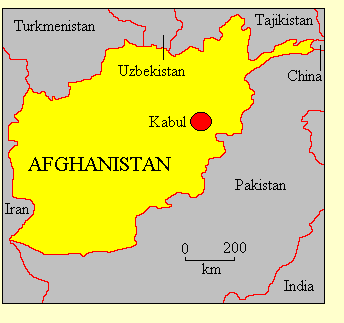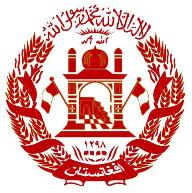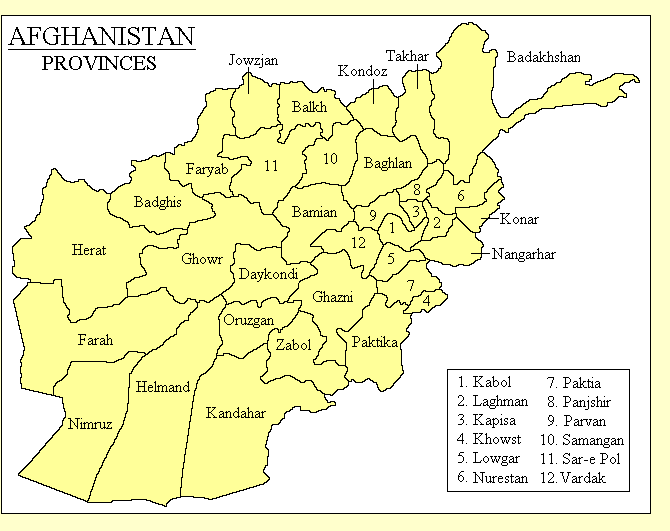

ISLAMIC STATE OF AFGHANISTAN
• Official name: Jomhuri-ye Eslami-ye Afganistan (Dari), Da Afganistan Islami Jomhoriyat (Pashto)
(Islamic State of Afghanistan)
• Location: Central Asia
• International organisations: Non-Aligned Movement, The Organisation of Islamic
Conference, The United Nations
• Borders: China, Iran, Tajikistan, Turkmenistan, Pakistan, Uzbekistan
• Coastline: None
• Land area: 647,500 Km2
• Population: 28,150,000 (estimate)
• Annual GDP (PPP) per capita: US$800 (2009 CIA estimate). World ranking: 185. On this index
Afghanistan is the world's poorest country outside Africa.
• Ethnicity: Pashtun 42%, Tajik 27%, Hazara 9%, Uzbek 9%, Aimak 4%, Turkmen 3%, Baluchi 2%, others 4%.
• Languages: Pashtu is the official language but is the first language of only 35% of the population.
Dari, an Iranian language, is spoken by 50%, and Turkic languages such as
Uzbek and Turkmen by 11%. Many other languages such as Baluchi are spoken.
• Religion: Sunni Muslim (the state religion) 80%, Shi'a Muslim 19%
• Form of government: Presidential republic. Afghanistan is divided into 34 provinces.
• Capital: Kabul

• Constitution: The new Constitution of Afghanistan
was signed on 16 January 2004.
• Head of state: The President, elected for a five-year term by universal suffrage.
• Head of government: The President appoints the Cabinet.
• Legislature: Afghanistan has a bicameral National Assembly consisting of the House of the People (Wolesi Jirga), with up to
250 members directly elected for five-year terms, and the House of Elders (Meshrano Jirga), composed of one representative from
each provincial council, one representative from each district council, and a number of presidential appointees, of whom half
must be women.
• Electoral authority: The Joint Election Management Board runs elections.
• Freedom House 2011 rating: Political Rights 6, Civil Liberties 6
• Transparency International Corruption Index: 14% (176 of 178 countries rated)
• Reporters Without Borders Press Freedom 2010 Index: 48.3% (147 of 178 countries rated)
• Heritage Foundation Economic Freedom 2010 Index: no rating given.
Political history
Afghanistan (which means "Land of the Turbulent" in Persian), was under the nominal authority of the Shah of
Persia until 1747, when Ahmad Shah Durrani, a Pashtun warlord, established an emirate at Kabul which became the
Kingdom of Afghanistan. During the 19th century there was a series of wars with the British Empire, but
Afghanistan proved difficult to conquer and anyway the British preferred it to remain an independent buffer state
between India and Russia.
King Amanullah (1919-29) tried to modernise Afgfhanistan on the lines of Ataturk's Turkey, but the forces of
conservatism proved too strong. Under his successors there was little change until 1946, when King Mohammad Zahir Shah
began limited political reforms, leading to Afghanistan's first constitution in 1964. These reforms were reasonably
successful, but in 1973 an ambitious relative, Mohammed Daoud Khan, seized power in a military coup and declared a
republic. He in turn was overthrown by a faction of pro-Soviet Communists in 1979, although it is not clear whether
the Soviets encouraged this.
When Afghanistan's conservative regional warlords rebelled against the Communist regime in Kabul, the regime
appealed for Soviet aid, and this led to ten years of bitter warfare. The US, China, Pakistan and Saudi Arabia
funded and armed the Islamic resistance for a variety of motives. Many figures who later became well-known, such as
Osama bin Laden, received their military training in Afghanistan.

In 1989 Mikhail Gorbachev pulled the Soviet forces
out, and in 1992 the Communist regime collapsed. Attempts to establish a stable regime in place of the Communists soon failed, and the country lapsed
into civil war. In 1998 the Taliban, a militant Islamist movement, seized power and established a theocratic regime.
This regime soon aroused armed opposition, mainly in the Turkic-speaking north, but received crucial support from
Pakistan, and also some international support for its suppression of the drug trade.
The Taliban allowed Osama and other terrorist leaders to base themselves in Afghanistan, and after the
September 11, 2001, terrorist attacks on the US, the US government demanded that Afghanistan hand Osama, the main
suspect, over to them. When the Taliban refused, the US invaded the country with the assistance of the anti-Taliban
Northern Alliance, which captured Kabul in November.
Since 2001 Afghanistan has been occupied by the US and a coalition of allies. The former King Mohammad Zahir Shah
returned and presided over a Loya Jirga (Grand Council) in June 2002. The Loya Jirga elected Hamid
Karzai as president for a two-year transitional period. Presidential elections, the first in Afghan history, were held in October
2004, and legislative elections were held in October 2005. Since then conditions have deteriorated in the face of
continued Taliban insurgency, and the government has been plagued by corruption. In 2009 Karzai was re-elected in elections widely regarded as
fraudulent.
Afghani politics are essentially regional and ethnic, and while there are dozens of political parties,
most of them are really the personal followings of various tribal or military leaders. Parties currently operating include the
United National Front, the Shi'a Islamic Unity Party of Afghanistan, and the
Afghan Social Democratic Party. The National
Islamic Movement of Afghanistan (Jumbish-i-Milli Islami Afghanistan) represents the Uzbek minority.
Freedom House's 2011 report on Afghanistan says:
"Afghanistanis not an electoral democracy. The overall results of the 2004 presidential election and delayed 2005 parliamentary elections
were broadly accepted by Afghans and the international community, despite allegations of intimidation by militias and insurgent groups,
partisanship within the electoral administration, and other irregularities. However, the 2009 presidential and 2010 parliamentary
elections were critically undermined by fraud and other problems, and state institutions have failed to provide effective governance or
transparency... Violence, insecurity, and repression continue to restrict political activity nationwide, particularly outside urban areas...
Afghan media continue to grow and diversify, but face major challenges including physical attacks and intimidation... Religious freedom has
improved since the fall of the Taliban government in late 2001, but it is still hampered by violence and harassment aimed at religious
minorities and reformist Muslims... The judicial system operates haphazardly, and justice in many places is administered on the basis of a
mixture of legal codes by inadequately trained judges. Corruption in the judiciary is extensive... In a prevailing climate of impunity,
government ministers as well as warlords in some provinces sanction widespread abuses by the police, military, local defense militias, and
intelligence forces under their command, including arbitrary arrest and detention, torture, extortion, and extrajudicial killings."
Updated October 2011
|


